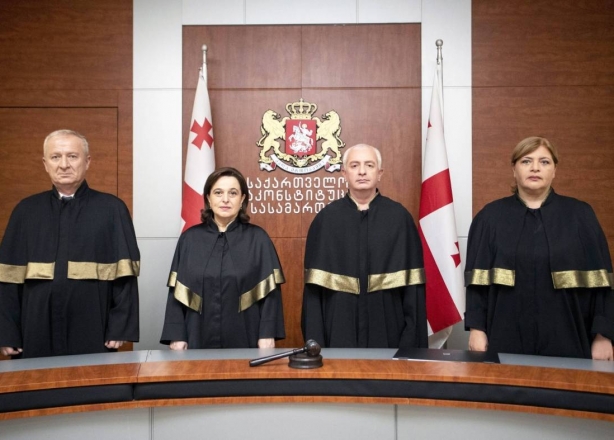News
Constitutional Court of Georgia Satisfies Constitutional Claim N1559
On December 23, 2022 the second board of the Constitutional Court of Georgia satisfied the Constitutional Claim N1559 (“Archil Mordebadze and Amalia Badaliani vs. Minister of Education and Science of Georgia”).
The disputed norm established that failure to appear at the test of the unified national exams deprived the entrant of the right to request additional testing, regardless of whether the failure to appear at the test was caused by an objective reason or not.
The complainants noted that according to the current legislation of Georgia, the enrolment of entrants in higher educational institutions, as well as the issuance of the state scholarship grant, was done annually, based on the results of the unified national exams. Accordingly, those persons who were unable to appear for the test in this or that compulsory subject were deprived of the possibility of receiving and financing higher education. The complainants deemed that those applicants who failed to appear for the test due to objective circumstances, such as hospitalisation due to health conditions, death of a family member or force majeure, should be given the opportunity to take an additional test.
According to the respondent, although the different test options of the same examination subject consisted of identical test items, in terms of difficulty, there could still be a slight difference between the different test options. Based on this situation, the National Centre for Evaluation and Examinations developed a mechanism for equating and levelling points, which included determining the percentage rank of a specific scale, then equating raw points and assigning an equalised point. For this procedure, it was necessary that the number of entrants in the examination sessions was approximately equal and their selection was based on the principle of randomness. By allowing the possibility of going to an additional session, it would be impossible to predict the number of entrants in advance, as a result, it would not be possible to equalise the points they received and the principle of equality would be violated. According to the respondent’s position, the protection of the mentioned good outweighed the right of the small number of entrants to be enrolled in higher educational institutions, who for some objective reason could not participate in the unified national exams. In addition, conducting an additional exam session required the mobilisation of additional administrative resources, which would lead to an increase in financial costs.
The Constitutional Court of Georgia first determined that the delegation of the authority to determine the results of non-appearance at the unified national exams by the Parliament of Georgia to the Minister of Education and Science was in accordance with the requirements of the Constitution of Georgia. The Court thereafter examined the essence of the mechanism of equation and equalisation of points and concluded that it in fact served to achieve such an important legitimate goal as the equal evaluation of the scores obtained in the unified national exams. Moreover, under the conditions of appointment of an additional session, it would not be possible to equate the points obtained by the entrants attending this session with the points obtained in the main sessions. In addition, it was clear that holding additional sessions would require increased administrative and financial resources.
The Constitutional Court emphasised the special importance of the right to receive and finance higher education in a democratic society and noted that the disputed norm involved a rather intensive interference in the said rights, as the concerned individual’s enrolment in a higher educational institution was limited to a period of 1 year. In addition, it was noted that the objective circumstances named by the complainant, such as the applicant's illness, the death of a family member, the pandemic and natural disasters, truly represented such factors that made it extremely difficult and/or impossible for a person to appear at the examination session.
The Constitutional Court of Georgia drew attention to the fact that as a result of the changes made in the legislation, the unified national exams of 2021 provided for the possibility of conducting an additional examination test in the event of the existence of the grounds specified in the legislation. At the substantive hearing of the case, the representatives of the examination centre explained that despite the busy work schedule caused by additional examination sessions, they still managed to conduct the unified national examinations of 2021 and publish the final results on time. The unified national exams of 2022 were held on the same principle.
Based on the above, it was clear that the examination centre had the ability to mobilise sufficient administrative and material resources to conduct an additional examination session. Therefore, the Constitutional Court considered that, neither in the interest of saving material resources nor in the interest of evaluating points as equally as possible, it could not be justified to limit the rights to receive and finance higher education in the manner provided for by the impugned norm.
Consequently, the Constitutional Court recognised the disputed norm as unconstitutional, and its annulment was postponed until April 1, 2023, in order to give the Minister of Education and Science of Georgia a reasonable period of time to introduce the changes necessary for the implementation of the present judgement.
Subject of dispute: Constitutionality of the Paragraph 5 of the Article 20 of the “Rule on holding Unified National Exams” adopted with Appendix N 1 of the Decree N 19/N issued on February 18, 2011 by the Minister of Education and Science of Georgia upon “Holding of Unified National Exams and Adoption of Rule for Distribution of State Academic Grants” in relevance with Paragraph 1of the Article 27 and Sentence 4 of the Paragraph 2 of the Constitution of Georgia.


